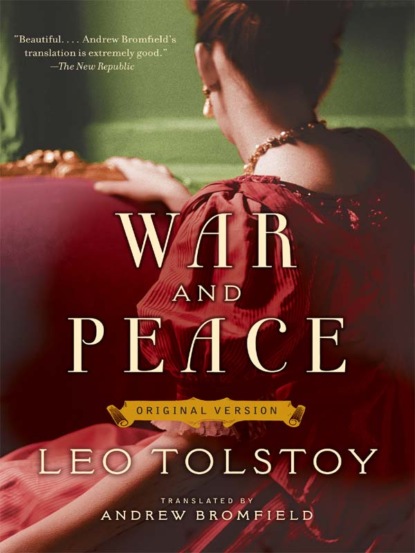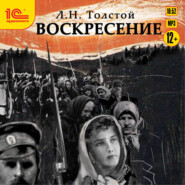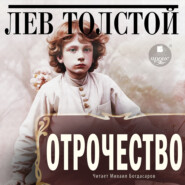По всем вопросам обращайтесь на: info@litportal.ru
(©) 2003-2024.
✖
War and Peace: Original Version
Автор
Год написания книги
2019
Настройки чтения
Размер шрифта
Высота строк
Поля
“Look at papa,” cried Natasha so loudly that everyone could hear, bending her curly head down to her knees and setting the entire hall ringing with her peals of laughter. And indeed, everyone who was there in the hall gazed with a smile of joy at the jolly little old man beside his stately lady, Marya Dmitrievna, who was taller than he, as he curved his arms and shook them in time, straightened his shoulders, turned out his feet, tapping them lightly and, with the smile spreading further and further across his round face, prepared his audience for what was to come. As soon as the jolly, challenging strains of the Daniel Cooper began to ring out like a merry vagabond song, all the doors of the hall were suddenly crammed full, by male faces on one side and, on the other, by the smiling female faces of all the servants who had come out to look at their master making merry.
“Our old father! What an eagle he is!” said a nanny from one door. The count danced well and he knew it, but his lady did not know how to dance at all and had no wish to dance well. Her massive body was held rigidly upright with her powerful arms lowered (she had handed her reticule to the countess) and only her severe but beautiful face danced. Everything that was expressed in the whole of the count’s rotund figure Mariya Dmitrievna expressed only in the ever brighter and wider smile on her face and her twitching nose. But while the count, working himself up more and more, captivated his audience with the sudden surprise of his nimble arabesques and the light capering of his soft legs, Marya Dmitrievna, by taking the very slightest pains in moving her shoulders or curving her arms, in turning and stamping her feet, produced no less an impression for her efforts, which were appreciated by everyone in view of her corpulence and customary severity. The dance grew more and more lively. The other dancers were unable to attract the slightest attention to themselves, and gave up trying. All eyes were riveted on the count and Marya Dmitrievna. Natasha tugged at the sleeves and dresses of everyone around her, who in any case already had their eyes fixed on the dancers, and demanded that they watch her dear papa. In the pauses in the dance the count struggled to catch his breath, waving his hand to the musicians and shouting for them to play faster. Quicker and quicker, ever more jauntily, the count twirled this way and that, hurtling around Marya Dmitrievna, now on his tiptoes, now on his heels and finally, having swung his lady back to her place, he took the final bow, drawing his supple leg back behind him, lowering his perspiring head with its smiling face and stretching out his curved right arm in a broad sweep amid thunderous applause and laughter, especially from Natasha. Both dancers stopped, struggling to catch their breath and wiping their faces with fine lawn handkerchiefs.
DANCING THE DANIEL COOPER Drawing by M.S. Bashilov, 1866 (#ulink_c90dd2f7-e31e-5cb1-9fb6-8f28b0482319)
“That’s how they used to dance in our time, ma chère,” said the count.
“Hurrah for Daniel Cooper!” puffed Marya Dmitrievna, breathing out long and hard.
XXVIII
While at the Rostovs’ house they were dancing the sixth anglaise to weary musicians playing out of tune and the weary footmen and chefs were preparing supper, discussing among themselves how the masters were able to keep on eating – they had only just finished their tea and now it was supper time again – at this very hour, Count Bezukhov suffered his sixth stroke, and with the doctors declaring there was no hope of recovery, the sick man was given mute confession and communion, and preparations began to be made for extreme unction, filling the house with the bustle and anxious anticipation usual at such moments. Outside the house, beyond the gates, concealing themselves from the carriages that were arriving, a throng of undertakers waited in anticipation of a rich commission for the count’s funeral. The commander-in-chief of Moscow, who had repeatedly sent his adjutants to enquire after the count’s condition, came himself that evening to take his leave of one of the representatives of the age of Catherine the Great. The count was said to be seeking someone with his eyes, asking for them. A mounted servant was sent for both Pierre and Anna Mikhailovna.
The magnificent reception room was full. Everyone rose respectfully when the commander-in-chief, who had spent about half an hour alone with the sick man, emerged, barely responding to their bows and trying to walk as quickly as possible past the glances trained on him by the doctors, clergymen and relatives. Prince Vasily, grown thinner and paler over the last few days, walked beside him, and everyone watched the commander-in-chief shake his hand and repeat something quietly to him several times.
Having seen the commander-in-chief out, Prince Vasily sat down on his own on a chair in the hall and crossed one leg high over the other, leaning his elbow on his knee and covering his eyes with his hand. Everyone could see he was suffering and no one approached. After sitting in this way for some time he stood up and, walking with unusual haste, glancing around with eyes that seemed either angry or frightened, went down the long corridor to the rear of the house to see the eldest princess.
The people in the dimly lit room talked between themselves in a faltering whisper, falling silent and glancing round with eyes full of questioning anticipation at the door leading to the dying man’s chambers every time it gave out a faint creak as someone came out or went in.
“Man’s span,” said an old man, a clergyman, to a lady who had sat beside him and was listening to him naïvely. “Even as thy span is fixed, thou shalt not exceed it.”
“I wonder, isn’t it too late to administer extreme unction?” asked the woman, adding an ecclesiastical title, as if she had no opinion of her own on this account.
“It is a great mystery, madame,” replied the clergyman, running his hands over his bald patch, over which several strands of greying hair had been carefully combed.
“Who’s that? Was that the commander-in-chief himself?” someone asked at the other end of the room. “How young he looks …”
“And he’s over sixty! Did they say the count can’t recognise anyone? They wanted to administer extreme unction.”
“I knew of one man who had extreme unction seven times.”
The second princess simply came out of the sick man’s room with tearful eyes and sat beside Lorrain, the famous young French doctor, who was sitting in a graceful pose next to a portrait of Catherine the Great, leaning his elbows on the table.
“Excellent,” said the doctor, replying to a question about the weather today, “excellent weather, but then, my princess, Moscow is so like the countryside.”
“Yes indeed, is it not?” said the princess, sighing. “Well, can he have something to drink?”
Lorrain pondered the question.
“Has he taken his medicine?”
“Yes.”
The doctor glanced at his Bréquet watch.
“Take a glass of boiled water and add a pinch” (with his slim fingers he showed her what a pinch meant) “of cream of tartar.”
“It has nefer happent,” said a German doctor to an adjutant, “that anyvone has surfifed a third stroke.”
“And how full of life he was!” said the adjutant. “And who will all this wealth go to?” he added in a whisper.
“Takers will be found,” the German replied, smiling.
Everyone glanced round at the door again as it creaked and the second princess, who had prepared the drink indicated by Lorrain, carried it in to the sick man. The German doctor approached Lorrain.
“Can he hold on until tomorrow morning?” the German asked, speaking in badly pronounced French.
Lorrain, pursing his lips, wagged his finger severely in front of his nose in a gesture of denial.
“Tonight and no later,” he said quietly with a decorous smile of self-satisfaction at his own ability to understand and convey the patient’s condition clearly, and walked away.
Meanwhile Prince Vasily opened the door into the eldest princess’s room. The room was in semi-darkness, there were only two icon lamps burning in front of the icons and there was a pleasant smell of incense and flowers. The entire room was crammed with little chiffoniers, closets and tables. The white coverlets of a high feather bed could be seen behind a screen. A little dog began barking.
“Ah, it is you, cousin.”
She stood up and arranged her hair, which was always, even now, so uncommonly smooth that it seemed to have been made in a single piece with her head and covered with lacquer.
“What is it, has something happened?” she asked. “I am so frightened already.”
“Nothing, everything is still the same, I only came to finish talking business with you, Katish,” said the prince, seating himself wearily in the armchair from which she had just risen. “My, how you have warmed it,” he said, “come, sit here, let us talk.”
“I thought something might have happened,” said the princess, and with her unvarying calm, strict, stony decorum she sat facing the prince, preparing to listen.
“Well then, my dear?” said Prince Vasily, taking the princess’s hand and by force of habit pulling it downwards.
It was obvious that this “well then” concerned many things that they both understood without naming them.
The princess, with her stiff, straight waist that was absurdly long for her legs, looked directly and fearlessly at the prince with her prominent grey eyes.
She shook her head and looked at an icon with a sigh. Her gesture could have been taken either as an expression of grief-stricken devotion or an expression of weariness and hope to rest soon. Prince Vasily took the gesture as an expression of weariness.
“Do you think,” he said, “it is any easier for me? I am as exhausted as a post horse, but even so I have to talk to you, Katish, and very seriously too.”
Prince Vasily stopped speaking and his cheeks began twitching nervously, first on one side, then on the other, lending his face an unpleasant expression such as never appeared on Prince Vasily’s face when he was in society drawing rooms. His eyes were also not the same as usual: they either glared with facetious insolence or gazed around in fright.
The princess, holding the little dog on her knees with her dry, thin hands, looked attentively into Prince Vasily’s eyes, but it was clear that she would not break the silence with a question, even if she had to remain silent until morning. The princess had one of those faces on which the expression remains the same, regardless of how the expression changes on another person’s face.
“Well, you see, my dear princess and cousin, Ekaterina Semyonovna,” Prince Vasily continued, evidently resuming what he had been saying with a certain inward struggle, “at moments such as this, one has to think of everything. We have to think about the future, about you … I love all of you like my own children, you know that.”
The princess gazed at him as drearily and rigidly as ever.
“Finally, I have to think about my family too,” Prince Vasily continued, angrily pushing the little table away from him and not looking at her, “you know, Katish, that you three Mamontov sisters, together with my wife, we are the count’s only direct heirs. I know how painful it is for you to talk and think of such things. And it is no easier for me, my friend, I am over fifty and I have to be prepared for anything. Do you know that I have sent for Pierre and that the count pointed directly at his portrait and demanded that he be brought to him?”
Prince Vasily looked enquiringly at the princess, but could not tell whether she understood what he had just said or was simply looking at him.
“I never cease praying to God for one thing,” she replied, “that He will have mercy on him and allow his noble soul to depart in peace from …”
“Yes, yes, quite so,” Prince Vasily interrupted impatiently, wiping his bald patch and angrily moving back towards himself the little table that he had pushed away, “but ultimately … ultimately the point is, you know yourself that last winter the count wrote a will in which he left the entire estate, bypassing the direct heirs and us, to Pierre.”

















